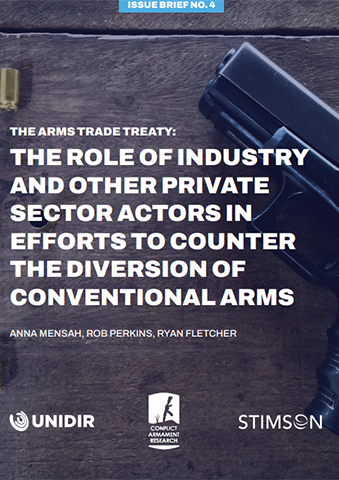This Issue Brief is intended to raise awareness and increase the knowledge of States Parties and other relevant stakeholders on effective ways of engaging industry and other private sector actors to prevent and address the diversion of conventional arms.
It presents a preliminary non-exhaustive mapping of industry and other private sector actors engaged in the various stages of the arms transfer chain and highlights some “red flags” and risk indicators that they can consider while conducting their day-to-day businesses to support States Parties in the detection and prevention of diversion. It also provides information on existing practices and opportunities for enhancing the engagement of industry and other private sectors actors within the ATT framework.
The paper is the fourth in a series of issue briefs released from a research Consortium established by UNIDIR, Conflict Armament Research and Stimson Center in 2019. The research aims at increasing knowledge and strengthening shared understanding on the Arms Trade Treaty (ATT) to support its effective implementation.
About the Consortium
The United Nations Institute for Disarmament Research (UNIDIR), Conflict Armament Research (CAR), and the Stimson Center established a research Consortium in 2019 aimed at increasing knowledge and strengthening shared understanding on the Arms Trade Treaty (ATT) to support its effective implementation. In 2023, the Consortium is conducting research and facilitating dialogue events on “The Role of Industry in Responsible International Transfers of Conventional Arms”, in support of the Republic of Korea’s Presidency of the Ninth Conference of States Parties (CSP9) to the ATT.
Citation: Anna Mensah, Rob Perkins and Ryan Fletcher (2023) "The Arms Trade Treaty: The Role of Industry and Other Private Sector Actors in Efforts To Counter the Diversion of Conventional Arms", UNIDIR, Conflict Armament Research, and Stimson Centre. https://doi.org/10.37559/CAAP/23/ASC/07
